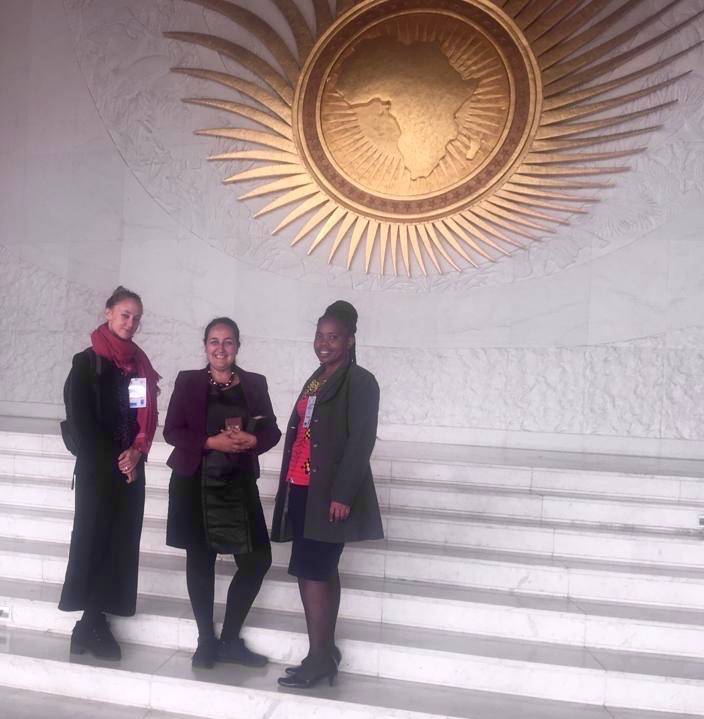IDC at the NANHRI & AU Policy Forum
As a result of the IDC’s collaboration with the Network of African National Human Rights Institutions (NANHRI) over the past few years, we were invited to speak at the NANHRI and the African Union Commission Department of Political Affairs (AUC-DPA) Policy Forum in Addis-Ababa, Ethiopia in September 2019. This years theme was: “National Human Rights Institutions’ (NHRI’s) contribution to Durable Solutions on Forced Displacements in Africa.”
Junita Calder, IDC’s Regional Coordinator for Africa and the Middle East, gave a presentation on the role that alternatives to traditional, broken migration systems can play in enabling migrants to contribute to economic development across the continent.
This links to IDC’s broader vision: a world without unnecessary immigration detention; and with Rights & Dignity for all who migrate. We are interested in “real world fixes” that acknowledge legitimate government aims and work to achieve these through a problem solving approach. Calder highlighted that:
Alternatives require that migrants’ basic needs be met, within host communities. Therefore, if migrants can contribute economically while in the country, it creates a win-win situation, ensuring their rights, as well as continued benefits to host communities, during – and after – their stays.

The Possibilities of Creative Approaches to Migration Governance
Calder shared examples of “Alternatives to immigration detention”, which can be found in “There Are Alternatives: Africa.” These examples have been collected by the IDC over the past 10 years from NGO members, with the aim to showcase their migration management efforts and use these examples to build an empirical evidence base to present to governments (in national, regional and international policy spheres) what’s possible when creative approaches are applied to migration governance, rather than defaulting to the use of harmful, costly and inefficient detention.
Importantly though, solutions must be tailored to the particular national circumstances. The IDC promotes a pilot approach – supporting the implementation of alternative migration management that is adapted to the context, and subject to constant review and adjustment.
International, Regional & National Frameworks to Promote Alternatives
Calder also signposted a range of international, regional and national legal and policy frameworks that promote rights-respecting migration management. Readers, as well as those who were present at the Policy Forum, might find these a useful resource:
INTERNATIONAL FRAMEWORK
- MDGs: Millennium Development Goals & SDGs: Sustainable Development Goals.
- GCM (Migrant Workers at their families Convention, et al. and ongoing guidance by relevant bodies).
- GCR (Refugee Convention and ongoing guidance by relevant bodies).
- UDHR and Human Rights Framework more broadly.
REGIONAL AFRICAN FRAMEWORK
- Africa’s approach to Alternatives – and therefore the potential for migrants’ economic contributions – is unique and world leading. The African Common Position when negotiating the GCM was strong. Removing the criminal nature of sanctions; ending child detention.
- The Policy framework exists; and is good: OAU Convention on Refugees and the Kampala Convention.
- One practical example, economically motivated but rights-respecting is: Agenda 2063; and the practical steps towards it so far:
- AU Migration policy framework (2018-30)
- Role of the RECs in increasing legitimate pathways
NATIONAL FRAMEWORK
- National Constitutions
- Other Human Rights Frameworks
- Refugee and Anti-Trafficking Acts
- Migration Policies
- Labour Rights Protection Legislation
- NHRIs roles
- Monitoring all Alternatives and access to decent work
- Monitoring places of detention NPMs and other monitoring guides/frameworks
Moving Forward: What Now?
The IDC is looking forward to working with NANHRI, specifically, to help with the implementation of their Plan of Action that outlines ways in which NHRIs may contribute to finding durable solutions to forced displacement.
Here are the ways the IDC suggested African NHRIs and the AU governments present can now be active:
What can African Human Rights Institutions do to ensure dignity for all who migrate?
- When undertaking investigations and submitting reports, HRIs can include solutions-focussed recommendations about regular pathways, right and access to decent work for migrants and refugees
- HRIs can point to initiatives, especially African examples that already exist; which may have solved the situation that the HRI had been asked to investigate or comment on, if implemented properly in the national context(s)!
What can the AU governments do to ensure dignity for all who migrate?
- Be confident that there is a large body of evidence out there about alternative migration governance which harnesses the economic contributions of migrants so that being a host is not only burdensome.
- When representing their nations, they can feel a productive part of the African approach to the migration-development nexus which promotes more productive migration and migrant human rights compliance; not just unnecessary securitisation.
- African countries can carry out policy audits or Legal Environment Surveys (LEAs) that point to the rights for migrants.
If you, as a civil society organisation, have ideas of how NANHRI or African HRIs can work with you, please be in touch.
- [email protected] – Junita Calder, Africa & Middle East Regional Coordinator
- [email protected] – Florence Situmbeko, Africa Programme Officer
- [email protected] – Tiffany Shakespeare, Africa & Middle East Network Coordination Programme Officer
